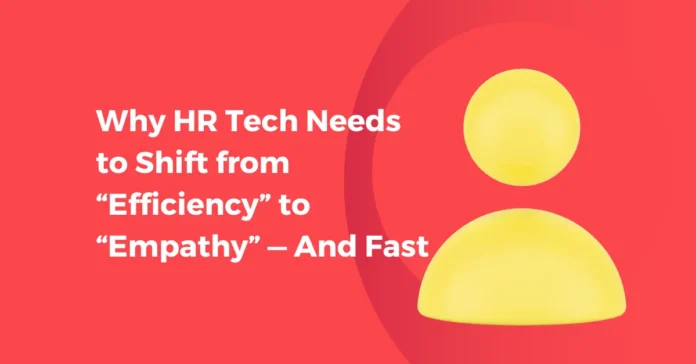Over the last decade, HR technology has focused on digitization, automation, and cost reduction. From applicant tracking systems (ATS) to AI-powered resume screeners and self-service portals, the goal has mostly been efficiency.
But in 2025, efficiency alone isn’t enough.
We’re entering an era where employee experience, emotional intelligence, and trust will define the most successful organizations – and the tech we use in HR must reflect that.
1. Efficiency Got Us This Far — Now It’s Time for Empathy
Let’s be clear: automating routine HR tasks was necessary. Nobody wants to go back to filing cabinets and faxed resumes. But today, the bigger challenge is human connection at scale.
Remote work, hybrid teams, and the rise of Gen Z in the workplace have reshaped expectations. Employees now demand:
- Transparency in communication
- Personalized career paths
- Wellness support that goes beyond checkboxes
- Leaders who listen, not just manage
HR tech needs to evolve from being an internal tool to being a trust-building platform.
2. Real-Life Example: From Metrics to Meaning at Patagonia
Take Patagonia, for instance — a company consistently ranked as one of the best places to work. They’ve leaned into empathetic HR practices supported by tech.
Rather than using performance software to track KPIs in isolation, their tools are configured to encourage open feedback, emotional check-ins, and value alignment. Employees have access to mental health support via integrated apps, and leadership uses data not to micromanage, but to foster well-being.
Their turnover rates are among the lowest in the industry — proof that tech-enabled empathy drives retention.
3. Hiring Isn’t Just Matching Resumes Anymore
Today’s candidates expect purpose, flexibility, and inclusion. If your tech stack only focuses on job matching based on keywords, you’re missing the mark.
Modern recruitment platforms are evolving:
- AI-driven tools now assess emotional cues in interviews.
- Video platforms enable asynchronous storytelling from candidates.
- DEI analytics dashboards are helping uncover unconscious bias at scale.
It’s not about hiring faster — it’s about hiring better.
4. Rethinking Employee Onboarding and Development
A common disconnect? HR platforms treat onboarding as a checklist — not a relationship-building opportunity.
What if HR tech could:
- Deliver personalized onboarding content based on personality types?
- Match new hires with culture ambassadors or mentors automatically?
- Predict burnout risk using behavior signals and flag it to team leads?
The tools exist. But intent matters more than features.
5. The Future Belongs to Platforms That Listen
The next wave of HR tech will be platforms that act like a Chief Empathy Officer. We’re already seeing it with tools like:
- Lattice and Culture Amp adding pulse surveys tied to action plans
- BetterUp combining coaching with mental wellness insights
- HiBob promoting a culture-focused view of employee journeys
These aren’t “nice to have” tools. They’re shaping whether companies can retain top talent or lose them to more human-centric competitors.
Final Thought: Tech Should Humanize HR, Not Replace It
HR Tech should help people feel seen, heard, and supported — not just managed. The companies that understand this shift will lead in talent acquisition, retention, and culture in the years to come.
#HRTech #FutureOfWork #EmployeeExperience #WorkplaceWellbeing #HRInnovation #EmpathyInTech #PeopleFirst #DEI #TalentRetention #DigitalHR #CultureDriven #RemoteWork #HRStrategy

